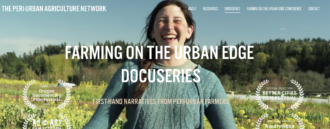Many peri-urban regions in the western U.S. are in a state of acute juxtaposition between formerly rural agricultural communities and growing, modern urban centers. Urbanization challenges agricultural viability through land use pressures and a slow unraveling of historically land-based economies and culture. These agricultural circumstances can be very destabilizing and highlight the need for agriculture to be efficient, well-informed, current, culturally networked, and unafraid to evolve and diversify. Current trends are giving rise to unprecedented opportunities for an agricultural renaissance and growth of a diversified, multi-tiered agricultural economy that supports 1) agricultural enterprises on a wide range of scales, 2) innovative value-added market structures, and 3) preservation of a land-based culture that values farming and food.
Want more information? See the related SARE grant:
This material is based upon work that is supported by the National Institute of Food and Agriculture, U.S. Department of Agriculture through the Sustainable Agriculture Research and Education (SARE) program. Any opinions, findings, conclusions, or recommendations expressed in this publication are those of the author(s) and should not be construed to represent any official USDA or U.S. Government determination or policy.
